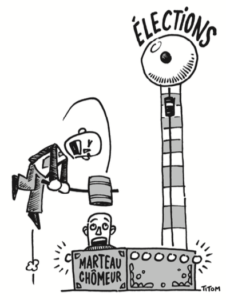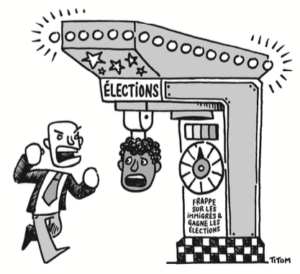
Julian Assange
631 weeks of deprivation of liberty for telling the truth
631 weeks of deprivation of liberty for telling the truth
Unemployed workers, if you have to visit your union, don’t go without taking some precautions. In particular: take away from reading. Our advice…
It is too narrow to contain the line of unemployed people that spreads out there every day and regularly overflows onto the sidewalk.
Often, the reason for your presence in this place is already enough to lower your morale: conflict with an employer, unfair dismissal, administrative problems with the Regional Employment Office, the local administration, the mutual insurance company or the ONEM,… When some don’t ask you to prove your determination to get a job, others urge you to come back with this or that form duly filled and sealed by another administration… So here you are, looking for support to help you better understand what they want from you, to face these endless harassments and to give you back some pride, fighting spirit and humanity in this system that anguishes you, makes you feel guilty, humiliates you, infantilizes you and designates you no longer as an unemployed worker but as a potential fraudster, or at least as a profiteer of the social security.
This room is your « service center ». It symbolizes the relationship you have with your union, as do hundreds of thousands of other unemployed dues-paying members of these organizations who are there, thankfully, to defend your rights in a spirit of camaraderie and solidarity. So you can feel at home, like one of many members of a big family, with young and old, women pulling strollers, crying children, men grumbling loudly while trying to nonchalantly pass everyone in line, the badly awake, the patient and the impatient, the nervous and the stressed out…
Inside, two counters are at your disposal, four mornings a week for three hours a day. The welcome is friendly and the service first class, within the limits of the possible of course… Because if the Belgian unions claim an impressive number of members and that this is partly due to the fact that they play the role of unemployment benefit fund, they do not have the means to pay so many counter staff that would be required by the unemployed people who come to these centers every day, which are too small to hold so many people.

In my service center, there are good times when both counters are open at the same time. Logic dictates that one of them should be reserved for specific procedures that seem to concern only a small minority of people, since no line forms there, unlike the neighboring counter.
So even though it’s a bit of a second home, I prefer to avoid going there too often in my service center. Although I am unemployed, my life is not limited to this state and status. In order not to wait half a day before receiving advice or a document, the best solution is to get up at dawn to be among the first to walk the sidewalk while waiting for the counters to open. Which, admittedly, can be quite nice in summer. And besides, why should the unemployed have the privilege of sleeping in? Getting up early and experiencing patience can only help you get active and fight idleness.
If you are not an early riser, the first line can easily last a good two hours and when you reach the « fast counter », it is often to be told that the purpose of your visit requires an interview with one of the agents on the other side of the wall. A new waiting period begins. But this time, you are comfortably seated in one of the metal chairs in the waiting room with a numbered ticket similar to a raffle ticket but which guarantees that your case will be treated today.
A toilet? We are not in a hotel. Nothing is there to encourage you to have such natural needs, neither a hot drink dispenser nor a glass of water.
To help you wait, a few brochures are available to familiarize yourself with a particular professional plant, while two screens on the walls provide continuous information. One, probably intended to soothe the anxious unemployed person that you are, gives your mind a chance to rest while contemplating the famous Windows wallpaper with its large green meadow and blue sky. The other one, more informative and demanding, scrolls in turn dates of union meetings and a call to participate in a big demonstration in favor of purchasing power… information available only in Flemish and unfortunately somewhat dated, the appointments having sometimes passed several months or years ago.
Waiting is an art that requires knowing some tricks. So, if you are still in the waiting room when the counters close, don’t venture out of your service center to get some fresh air on the sidewalk, smoke a cigarette, make a phone call, take advantage of those lost hours to run an errand, look for something to read at the bookstore, have a coffee, eat something, take the kids for a walk, put money back in the parking meter,… Because if you miss the deadline, you will find the door closed when you return and no one to open it. It doesn’t matter that you have been waiting for a long time for your ticket and that your waiting time is still estimated to be at least one hour.

Returning to the waiting room can only be done through a back door. But beware, this exposes you to the wrath of fellow unionists who will have no choice but to evict you from the premises manu militari. The rules are the rules. In this case, you will only have to come back the next day.
To avoid this kind of disappointment, it is best to remain seated while waiting for your turn. And if you are not satisfied with the conditions of reception, you are free to bring your own toast, thermos, small pillow, walkman, crossword puzzle or any other reading material of your choice…
Here, on my last visit to my service center, sitting pretty on my little pad, I read Choming Out(1). This essay written by three « Cybermandaïs » from Liège is based as much on the political analyses of the authors as on their militant and voluntary career, their experiences of salaried work and unemployment in the private, public and associative sectors. With my headphones screwed in my ears, nothing could divert my attention from this text denouncing the erosion of social achievements over the last 30 years in the name of « employment » and « economic recovery », inviting the reader in turn to get out of fixed positions, to no longer see « the value of work » as the sole and unique vector of socialization, to refuse the injunctions to employability, to connect the question of work to that of ecology, to redefine the notion of « suitable » work, to reverse the relations of power, to demand the redeployment of public services accessible to all or the establishment of a « socialized, generalized and unconditional income »… It is rare to read a text that proposes to shift our perspective on unemployment and invites us to consider the unemployed as producers of meaning and knowledge, of non-market values…
I felt light when I closed this book. Guilt-free, mobilized. While inwardly thanking my union for allowing me to take the time for this reading, I looked up to realize that my number had passed. I had missed my turn. No need to insist, I knew the rules. I would then drop the book in the middle of the union literature, hoping someone would pick it up, and leave my service center.
I’ll come back tomorrow.
Gwenaël Breës